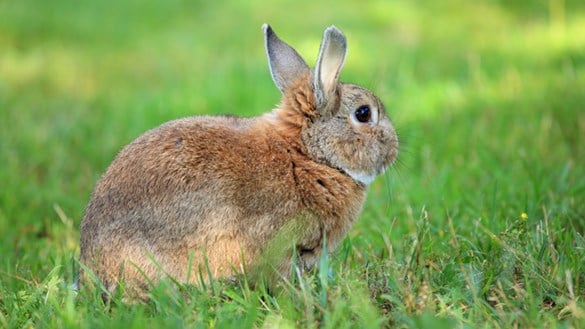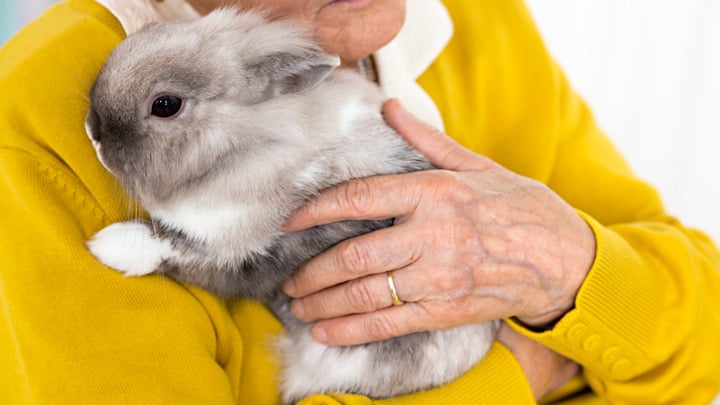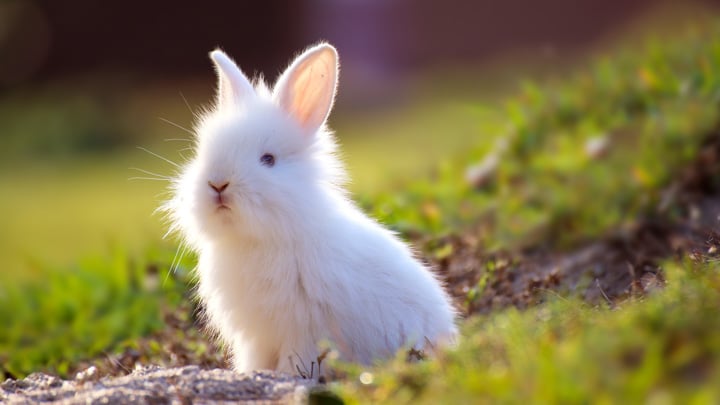Understanding Your Rabbit's Behaviour
Rabbits are adorable creatures and much-loved family pets, but their body language is subtle and it’s not always easy to work out how they’re feeling. We know you love your bunny and want the best for them, so we’ve tried to answer some of the most common questions about their behaviour.

Social behaviour
Rabbits thrive in the company of other rabbits. They are a prey species naturally meant to live in a social structure. This enables them to communicate effectively and greatly reduces stress levels. Rabbits can bond strongly with other rabbits, which greatly enhances their welfare. Putting two rabbits together however can cause serious issues, especially if they are not neutered. Pairing up should be done gradually.
Common rabbit behaviours
Your pet rabbit can’t tell you how they’re feeling and unlike dogs and cats they don’t bark or meow to give you a clue. We understand it can be frustrating trying to figure out if they’re content. But there are some common behaviours you might notice in your pet:
- Foraging – Your pet is a natural-born forager. Searching for their food not only provides interest but it aids their digestion too. For indoor rabbits, consider providing grass in turf trays to encourage natural behaviour, and provide fresh forage where possible. You can also stuff hay in cardboard tubes and hide them around the house to encourage foraging behaviour.
- Grooming – Rabbits like to keep themselves clean and will groom themselves throughout the day. If they live as a bonded pair, you’ll find them grooming their mate. If they’re tame enough, they’ll even groom you, licking your hands and face. Long-haired rabbits can be groomed to prevent fur ball formation. If your pet rabbit struggles with grooming, due to stiffness in old age, a large dew lap, or dental problems, make sure to groom them regularly to maintain coat condition.
- Digging – Rabbits naturally dig their own burrows or dig down to roots of their forage. Providing them with the opportunity to dig will positively impact their welfare, and also reduce the need to trim their nails!
- Chinning - Your rabbit will rub things with the underside of its chin to mark it with its scent. It may even rub its chin on you.
- Binkying – Leaping around helps get rid of excess energy. It also shows your rabbit is happy. Ensure your rabbit has plenty of space to race around every now and again!
- Thumping – Your rabbit might thump its hind foot if it thinks there is danger nearby to warn other rabbits. Male rabbits will sometimes use it to show they want a mate while neutered rabbits do it to show annoyance.
- Fur Pulling – May be a sign of boredom or pain, but you may see it in un-neutered females experiencing a phantom pregnancy.
- Grinding teeth –If it’s constant, loud and accompanied by other signs it could be an indication they’re in pain.
- Nudging – Your rabbit will nudge you to get your attention. If they do it more forcefully it could be a sign they want you to stop what you’re doing.
- Growling and screaming – Female rabbits will sometimes make a growling noise if you’re in their space. It’s purely territorial and nothing to worry about. We hope however, you never hear your rabbit scream. It’s a truly horrible sound and one which indicates they’re in extreme pain or mortal fear.

What does my rabbit’s body language tell me?
Your rabbit can’t tell you how they’re feeling but you can learn a lot from their body language. Next time you play with your rabbit look at their ears – it can give you an idea if their relaxed or anxious.
A rabbit with their ears forward can mean they’re curious whereas upright can mean they’re on alert, on their guard and trying to hear better. If their ears are flat against their back and they’re tense they’re likely very fearful and trying to make themselves as inconspicuous as possible. However, if they do this with their ears while resting and sleeping it just means they’re really relaxed! Also, a rabbit that flicks its ears probably wants to play with you.
Flopping is another action which indicates your rabbit is content and happy. Your rabbit might have what looks like an attack then flop over on its side. Don’t be alarmed if you’re a rabbit novice and it’s your first time witnessing this – unless it’s really struggling it simply means your pet is completely relaxed. Provide a nice deep bed of hay and fresh straw, and you may witness it on a regular basis!
How do rabbits show affection?
Nudging, bumping into you or rubbing against you are your rabbit’s way of showing it would like to interact so give them a stroke or a cuddle. Rubbing their face against you and chinning are sure signs of friendship – rabbits will only do this if they recognise your scent and feel bonded to you.
How do rabbits show aggression?
On the other hand, rabbits can show aggression towards humans and other rabbits, usually because they’re frightened, frustrated or simply defending their territory. Your bunny might nip or bite or thump the ground with its feet. If they’re not used to being handled, confined to their hutch for long periods of time or you’ve put your hand in there when they’re not expecting it, it can spark aggressive behaviour.

Is my rabbit bored?
Rabbits are very active and curious animals but if they’re unable to run around and forage they can get a little bored, expressing that through aggressive behaviour. Boredom can also affect their health – a rabbit with nothing to do will eat to pass the time and become overweight, their nails may overgrow, or they could start chewing on items not suitable for rabbits, such as electrical wires around the house or the bars of their cage.
You can keep them entertained by giving them as big a run as possible to move around in and potentially dig, providing boredom breaker toys and swapping them out regularly for new ones and hiding their food so they have to look for it.
Abnormal rabbit behaviour
If your rabbit is unable to exercise, lacks mental stimulation or has no other rabbits for company, they may start to show unusual behaviour. Signs to look out for include biting the bars of their hutch, nipping at you, fur pulling or reduced grooming, changes in eating, drinking or toilet patterns, aggression, circling their run, sitting hunched up and hiding more than normal.
Abnormal behaviour can also be a sign your rabbit is in pain or distress. Taking them to the vet can rule out illness or injury, after which you can focus on altering their unwanted behaviour.
Your rabbit is highly intelligent and has its own individual personality. If you look after their specific needs and give them space to be themselves, they’ll thrive. Make sure you provide other rabbits for companionship, plenty of space, hiding areas, interesting objects, an area to dig and lots of stimulation. If they don’t have a mate, consider getting another rabbit to keep them company but remember to bond them first. Also, let your bunny mark their area with their scent, just as they would in the wild, and give them variety – it should help with any abnormal behaviour and ensure your pet has a long, healthy and happy life with your family.
If you need more information about your rabbit’s behaviours, contact your local vet.

